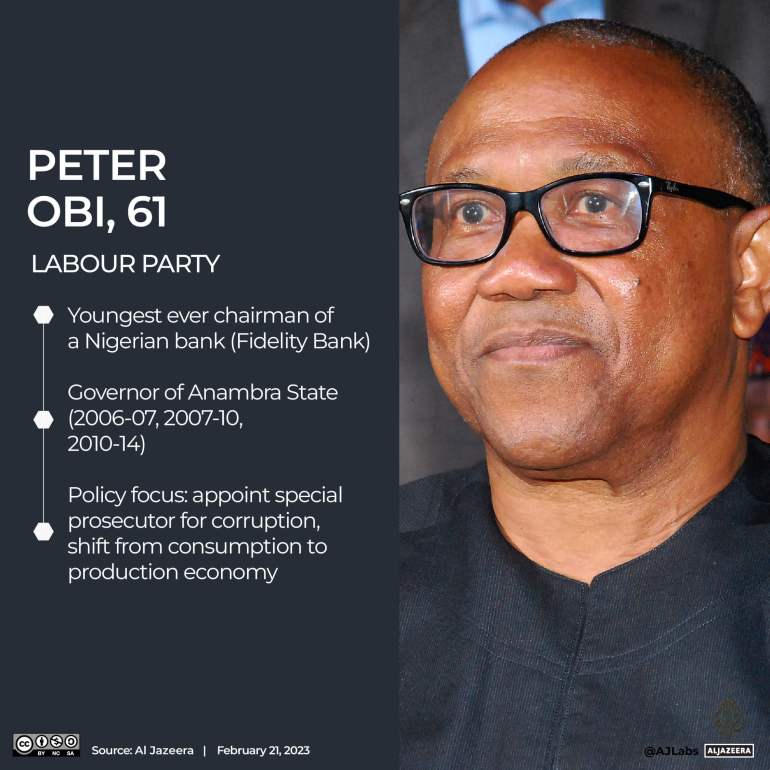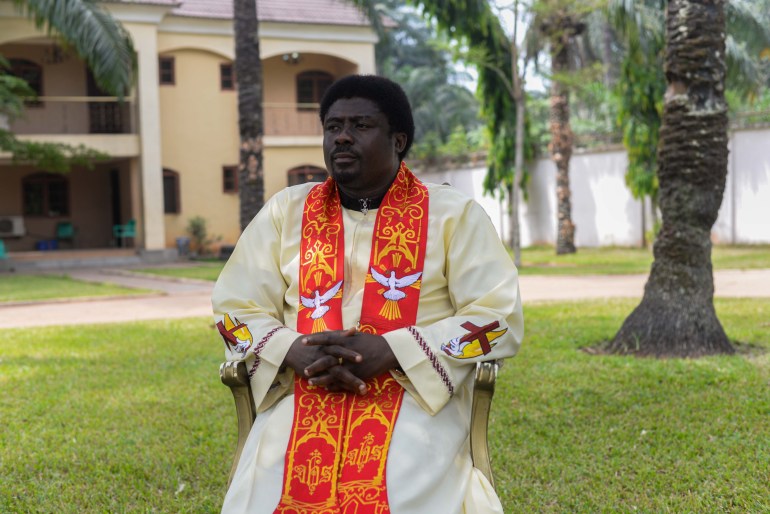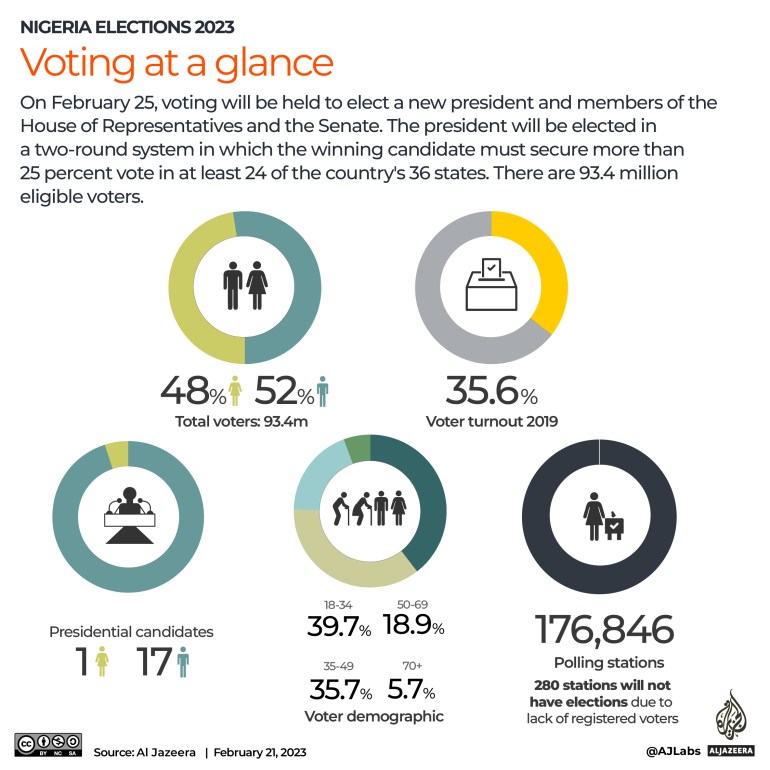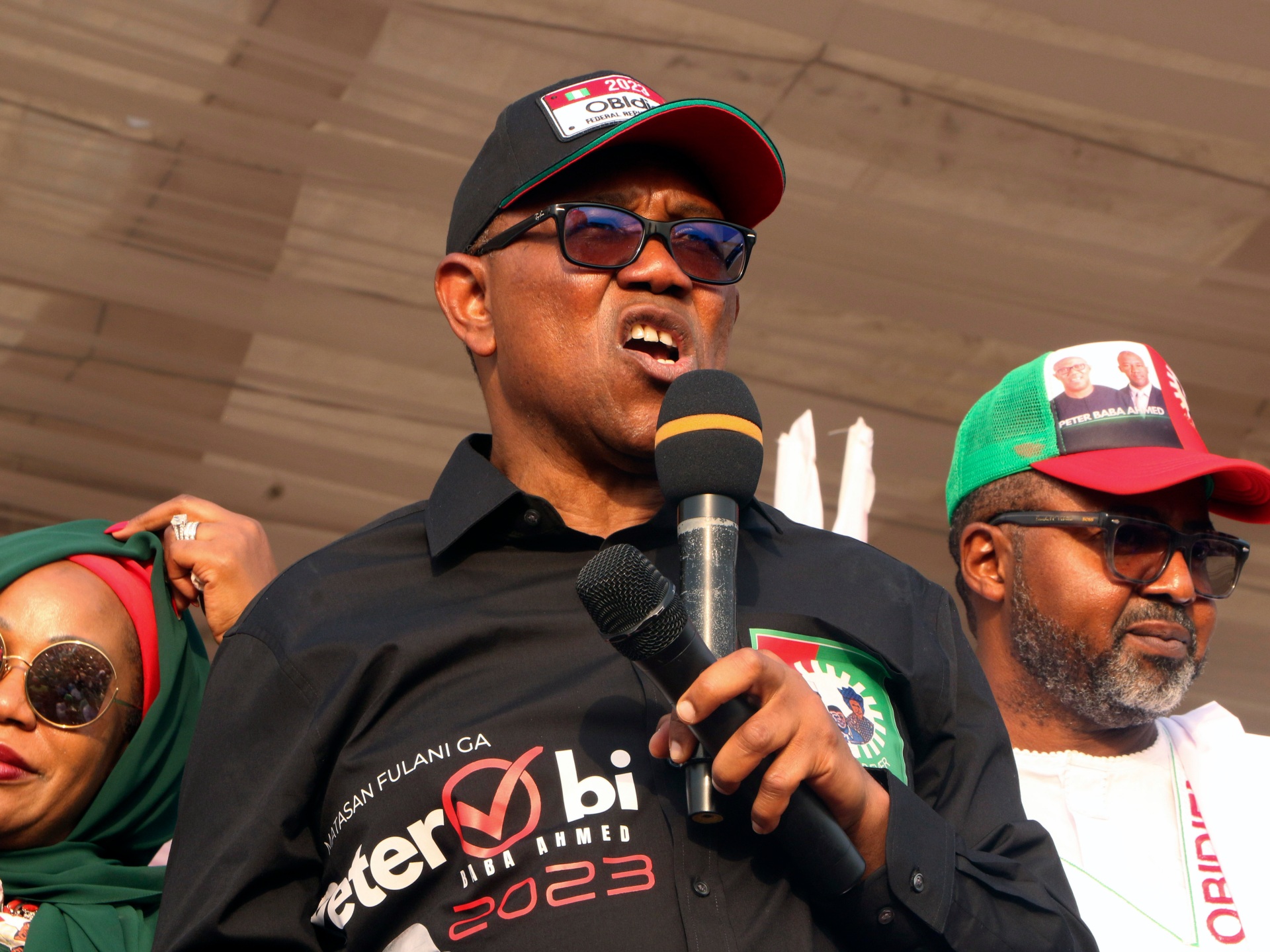Onitsha, Nigeria – Women are navigating wheelbarrows with food coolers. Cooling fans hang overhead on street corners above posters advertising ‘instant rat killer’ pesticides. Artisans polish half-finished draughtboards and picture frames. Mobile vendors wander with megaphones attached to medicine baskets full of tiny bottles engraved with claims of curing multiple diseases.
Even at half-capacity on the eve of Nigeria’s presidential election, the Onitsha market, one of the biggest in West Africa, is still pulsating with boundless energy that reflects the hustler mentality of the city.
By landmass, the southeastern state of Anambra is Nigeria’s second-smallest but is one of the country’s main economic hubs. At the heart of it is Onitsha, a major artery in the production and distribution networks that built Nollywood, the world’s second-largest film industry, from the ground up – and home to the market.
Across the city – and Anambra in general – hope is an omnipresent commodity. Peter Obi, its governor between 2006-2014 and a known trader in the market before and after his time in office, is being projected by multiple polls to win the race to replace outgoing President Muhammadu Buhari.
Obi was projected to win despite being a candidate from the Labour Party, which is not one of Nigeria’s two major parties.

The governing All Progressives Congress’s Bola Tinubu, the People’s Democratic Party’s Atiku Abubakar and Rabiu Kwankwaso of the New Nigeria People’s Party stand in the way of what could be a historic win.
Obi, 61, would be the first president born after Nigeria’s independence in 1960 and the first Igbo, the smallest of Nigeria’s three major ethnicities, to become president.
“He is a man of integrity, an instrument in the hand of God to move our country forward,” said Reverend Father Chibuzo “Ebube Muonso” Obimma, a popular priest in Dunukofia, 20 minutes outside Onitsha, who counts Obi as part of his congregation.
“I’ve known him for years. He is a man of discipline and very reasonable in spending. He is the best governor we’ve had in this state.”
Some attribute Obi’s popularity to his famed frugality with personal and government finances and overseeing massive investments in education, infrastructure, and security during his time as governor.

That nostalgia has led to overwhelming support across his birthplace.
“This is somebody that has shown from his public life that money cannot change who he is,” said Nweze Chimezie Nweze, a 39-year-old who runs a smartphone sales shop.
“No matter the kind of billions you throw around him, he is not bothered. This is a guy that wants to serve. This is what we need.”
Hope for a new era
But to make history, Obi must first conquer it. The Igbos seceded from Nigeria in 1967, returning 30 months after losing a civil war. Since it ended, people of the region have complained about political and economic marginalisation.
That has been a foundational grievance for the rise of separatist movements pushing for the actualisation – again – of Biafra, as the short-lived Igbo nation was then known.
Some of these movements have turned violent, losing initial goodwill with many of their kinsmen, who are frustrated with the ineffectual leadership that analysts said has plagued Nigeria for decades.
Al Jazeera saw trucks full of soldiers strolling through the city, presumably to keep the peace after a faction of the Independent People of Biafra (IPOB) gave a sit-at-home order to locals planning to vote in the region.
But the frustration with Abuja has emboldened many to want to defy the secessionists. Youths across parts of Nigeria have begun to believe that a new political era is near.
Obi’s critics have said this optimism – of those who call themselves “Obidient” – is borderline delusional. Still, his supporters have pressed on with conviction.
Aamarachi Perpetua, 23, a second-time voter, said she regretted voting for Buhari in 2019 and wanted to right that wrong.
“The level of hardship in our country, students, traders, everybody is complaining,” she said.
“If I’m paid salary, it’s too small because everything is too costly. I have a strong feeling that Obi can change things. When I was in secondary school, he gave us free education.”
Even older people in Onitsha have said that they will vote for him to end an era of endemic corruption and government wastage as Nigeria grapples with a rising debt profile that is being serviced by two-thirds of its revenue.
In the build-up to the election, cash and fuel shortages in what is one of Africa’s largest oil producers have also infuriated the public, especially entrepreneurs.
“They [the government] are just playing with the destiny of the nation … trading with the future of the youths,” Samuel Ohia, a 60-year-old engineer and head of a local construction company, told Al Jazeera at the market.
“I want this nation to move forward. When Obi becomes president, things will turn around .. we cannot run out of this nation. My voter’s card is on top of the table in my bedroom. I am fully Obidient.”
A string of high-profile endorsements at the regional and national level have helped carry Obi’s ambition further, from ex-presidents to technocrats and clergymen.
Obimma, who has publicly endorsed Obi, shrugged off criticism that the church should not be involved in partisan politics.
“From time immemorial, the church has played a vital role in human development,” he told Al Jazeera, sitting in the garden of a PDP chieftain’s country home.
“I’ve told him [PDP leader] that Atiku [Abubakar] will not get 1 percent vote in this state.”
A few metres away, dozens of villagers sat under canopy tents, presumably waiting for mobilisation funds before the election, one of the politician’s aides said.
‘My best day on Earth’
At the western end of Onitsha, a massive bridge over the River Niger, Africa’s third-largest river, connects the southeast to Asaba, capital of the oil-rich Delta state.
Unlike its noisier neighbour, Asaba has had no episodes of rebel activity and has been more stable.

The city is also slightly politically ambivalent in this election – while many young people support Obi, there is some sense of solidarity for the outgoing state governor Ifeanyi Okowa, who is running mate to the PDP’s Abubakar.
A Delta state government official told Al Jazeera anonymously for fear of retribution that he was voting for Obi, even though he had been publicly campaigning for the PDP.
And many of Obi’s public supporters are hopeful that the support, public or private, will translate into a win at the polls on Saturday, despite the odds being stacked against him.
Nweze, who has helped buy food and drinks for his voting unit on Saturday, is staying hopeful.
“The truth is that we are not God, there is a possibility that he may not win but we want to stay optimistic,” he said.
Obi could attend service at Obimma’s parish on Sunday and the priest was expecting a celebratory mood before what he said was an almost-certain win.
“How can Tinubu win? Peter Obi will be declared president of Nigeria and that day will be my best day on Earth. I can even tell God to take my life that day,” he said.
